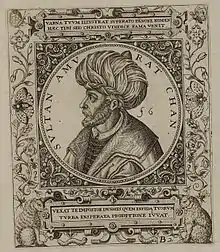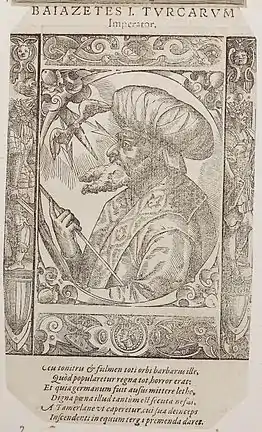Gülçiçek Hatun
Gülçiçek Hatun (Ottoman Turkish: گلچیچک خاتون; Greek: Γκιουλτσιτσέκ Χατούν, Gülçiçek = "rose blossom") was the first wife of Ottoman Sultan Murad I and Valide Hatun to their son Bayezid I.[1]


| Gülçiçek Hātūn | |
|---|---|
| Born | Maria c. 1335 Greece |
| Died | ? Bursa, the Ottoman Empire |
| Burial | |
| Spouse | Murad I |
| Issue | Bayezid I Yahşi Bey |
| Religion | Christianity at birth, converted to Islam after her capture |
Biography
According to a tradition, Gülçiçek was the consort of Aclan Bey, one of the Princes of the Anatolian Muslim Principality of Karasids. She was captured when Orhan conquered the principality (c. 1344) and placed in the Ottoman Palace. Some years later, when Orhan's son Murad had reached adulthood, an attempt was made to marry Gülçiçek, but she refused several names suggested to her, until Murad suggested himself. She married Murad I in 1359. There is a support for this story, or part of it at least, in the fact that she appointed her son Yahşi as trustee for an endowment deed she made for a Dervish Monastery, as Murad had no son of this name.[2]
She gave birth to two sons, Bayezid I and Yahşi Bey. In her lifetime she established a religious and charitable foundation which demonstrated her Muslim piety publicly. With its revenues she built a mosque and a tomb in Bursa where she was buried.[3][4]
See also
Further reading
- Peirce, Leslie P., The Imperial Harem: Women and Sovereignty in the Ottoman Empire, Oxford University Press, 1993, ISBN 0-19-508677-5 (paperback).
References
- "Sultan Yıldırım Beyezid Han". Republic of Turkey Ministry of Culture and Tourism. Archived from the original on August 13, 2014. Retrieved 2009-02-06.
- Leslie P. Peirce (1993). "Wives and Concubines: The Fourteenth and Fifteenth Centuries". The Imperial Harem: Women and Sovereignty in the Ottoman Empire. Oxford University Press. p. 36. ISBN 978-0-195-08677-5.
- The Nature of the Early Ottoman State, Heath W. Lowry, State University of New York Press (SUNY Press), p. 153
- History of the Ottoman Empire and Modern Turkey, Stanford Jay Shaw, Cambridge University Press, p. 28